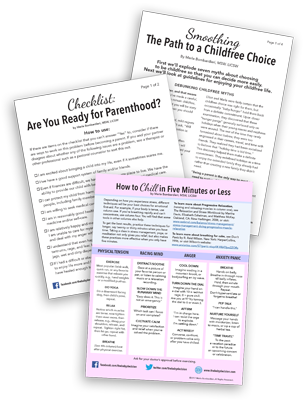
Talking with others about your reasons for not having children can feel tricky or invasive. Here Katie Wilson, co-host with Merle Bombardieri of The Decision Café on Facebook and contributor to The Baby Decision blog, discusses how, how much, and with whom she’s willing to talk about her childfree life choices.
by Katie Wilson, co-host of The Decision Café
I’m getting close to one decade of being childfree by choice. I feel confident with this decision and happy with the life that my husband and I have together.
Feeling confident in this decision has afforded many opportunities to have discussions with family members, friends, and colleagues about our childfree-by-choice decision. We never felt the need to officially announce our decision, but instead, discussions about our decision have occurred organically as the people in our lives have asked us questions or have brought up the topic in conversation.
These discussions have overwhelmingly been a great experience, as we have shared our decision and what is important to us with those who are closest to us. We feel people have approached us with support and curiosity and have many times felt reassured that we are happy and that this was an active decision for us not to have children…not an opportunity that had passed us by, or something we wanted but couldn’t have. We feel grateful for this support and understanding.
Not all conversations about our decision are easy. One thing I would have never expected is that the truly challenging conversations that occur about the childfree by choice decision are not with those closest to me, but with those that are in my life for only a short time. Small talk with an Uber, Lyft or cab driver are great examples, but these conversations can come up in any kind of customer service situation where I’m the customer and there’s enough time to engage in small talk. To some, it seems that the question, “Do you have children?” is as safe as, “How about this weather?”
For me, the question about whether I have children, when asked in this particular scenario, often leaves me feeling defensive, as I assume that as soon as the question is asked, I’ll eventually need to justify my decision to this stranger.
What I’m learning is that I don’t need to do anything. I don’t need to convince anyone that this is the right decision for me. I don’t even need to engage in the conversation. I’m still working on how I handle this. Here are some of the ways that I’m doing that:
Choosing how much to disclose:
In many situations where I feel the need to defend myself, it is because I offer more information than what is asked of me. When asked if I have children, I might offer that I have a dog, that I’m childfree by choice, and/or that I am married.
The truth is that I don’t know why I am being asked this question about whether I have children. It could simply be that someone is trying to engage with me in small talk, or that they’re curious how people can afford to live in the expensive urban area that is home for me. I’m making just as many assumptions about them and their question, as I feel that are being made about me. A simple and polite “no” can provide the opportunity to end that line of conversation or provide the opportunity to change the subject.
Choosing how to respond:
If the “no” prompts more questions, as it sometimes does, I can still have agency over my responses and how much I share. As my husband reminded me during a recent family visit where I was concerned I’d be asked a question related to a different sensitive subject, I can always say, “I’d prefer not to discuss this, thank you.” This response allows me to be polite, yet firm, but also prevents me from going down the path where I feel the need to share a very personal and well-considered decision with a stranger.
If the questioning persists, especially after politely declining to engage, it’s totally fair to flip the question by saying something along the lines of, “It sounds like having children is very important to you, is that right?” This may help steer a topic near and dear to their heart back in their court and gives them the opportunity to discuss their interest in children. After all, they are the one that brought up the topic, not me. If my attempt to flip the question back to them seems too personal to them, I am happy to respect their privacy, just as I hope they will respect mine.
Choosing who to have these conversations with:
If I am totally honest with myself, the reason why I’ve opened up to so many strangers in my life for mere minutes about this topic is that I feel the need to advocate for the childfree decision. I want to create awareness that not having children is a valid option in life and that many people are happy and fulfilled without children. I feel the need to educate people on the childfree decision. I’m emotionally attached.
The truth is, though, that this is not an effective way to go about sparking awareness. Childfree by choice could be the furthest thing from the person’s mind, as they drive me home. I’m not really doing any good here. Where my efforts might be better spent is engaging audiences through writing on this topic or engaging people with whom I already have a relationship on the topic of childfree by choice.
I have had multiple, well-meaning colleagues tell me that they’re concerned I will regret not having children someday. Because I know them and because we respect each other, I’ve been able to say, “You love your children so much and you could not imagine life without them. I can assure you that my decision was well-considered and I’m very happy. I have children in my life, but they are just not my own.”
That’s a much more effective way for me to advocate for childfree-by-choice than picking 15-minute battles with people who don’t know me—and who I don’t know.
By following this guidance, I can preserve my energy for more meaningful conversations, instead of feeling defensive and drained. I am very passionate about the topic of childfree-by-choice, but if I am to be any good at advocating for the childfree decision and childfree decision-makers everywhere, I am better able to serve if I can protect myself, my time, and my energy.
If I am ever asked a question about sports (something I have little interest in or attachment to, whatsoever), I am not rude or dismissive in my response when I say that I have no clue and that I don’t follow sports. People always pick up on the fact that sports will be a dead end with me and they either move to the next topic or the conversation trails off.
It’s not awkward, or emotional, it’s just over. I’d like to get to this level of detachment with the discussion of whether I have children, but truthfully, it’s very emotional for me. Until it’s not (and possibly it always will be), I will follow the three rules of thumb above: choosing what to disclose, choosing how to respond, and choosing my audience.
It’s late on a weeknight and I’m taking a Lyft home from a friend’s house. I’m tired and am looking forward to going to bed. The driver is female, younger than me, and asks me if I have children. I respond that I do not. She discloses to me that she has children by laughing and saying, “They are so much work!”
I don’t remember exactly how the conversation went from there, but her sweet way of meeting me in the middle made me feel it was okay to slowly open up. I asked her questions about her children, she asked me if I received pressure from family and friends to have children. By the time she dropped me off, I felt we’d both understood one another.
What has worked for you?
Are there any strategies that have worked for you for talking about not having children or avoiding / managing such conversations? Tell us what’s worked or not worked for you in the comments below, or in our Facebook group called “The Decision Café.”
You can find more insightful blog posts by Merle, Katie, and other contributors online here and in our bi-monthly email newsletter. If you aren’t subscribed yet, please stay in touch and sign up on our homepage or in the pop-up box below.
You can contact Merle on social media, or use the comments section here, or send an email using this website’s contact form.
Photo on this page by Kelsey Chance on Unsplash.com

